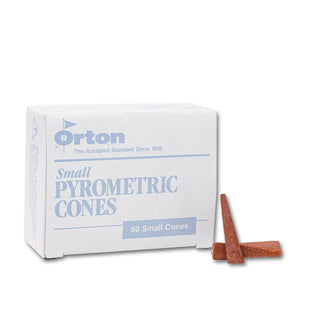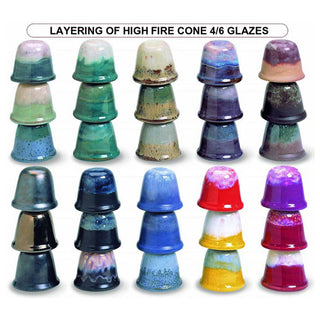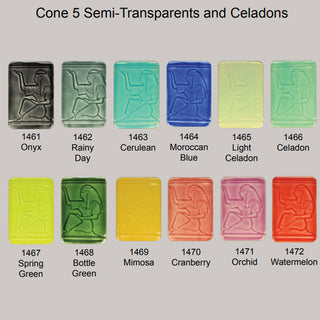ORTON SMALL CONES - 021 : Box of 50
Orton cones, pyrometric cones or witness cones are for accurate kiln firing. Order online from Sheffield Pottery Ceramic Supply.
Orton Pyrometric Cones for Ceramic Arts
Pyrometric cones measure heat-work (the effect of time and temperature).
Orton Pyrometric cones are slender pyramids made from about 100 carefully controlled compositions. Each cone number is unique in measuring temperature within a small temperature range (less than 30°C). Cones measure the amount of heat absorbed. As the cone nears its maturing range, it softens and the tip begins to bend, drawn down by the influence of gravity.

3 cone method for monitoring heat-work
Orton also provides a computer program to relate bending behavior of cones to temperature, heating rate and hold time.
Large and Self-Supporting cones are used as witness cones to monitor the firing and verify temperature uniformity.
Also see the Orton Cone Chart for temperature equivalent tables and Charts for converting cone bending angle to temperature.
Orton Cone Temperature Equivilancies
 Download and Print the Complete Orton Cone Wall Chart... Here.
Download and Print the Complete Orton Cone Wall Chart... Here.
Orton manufactures four different types of cones (Small cones, Bar cones, Large cones and Self-supporting cones).
The Large and Self-supporting cones are used to measure temperature uniformity and/or if there was sufficient heatwork done to mature the ware. Cones indicate whether the ware received an adequate amount of heatwork to properly mature the clay or glaze. A properly fired cone will bend over with the tip of the cone almost touching the shelf. After firing a kiln, a simple glance at the cone can tell if the firing was sucessful.
The small and bar cones are mainly used in the kiln shut-off device called the Kilnsitter. This is a mechanical device that shuts off the kiln when the temperature inside is sufficient to cause the cone to deform under the weight of the Kilnsitter rod.
The only true measurement of heatwork is from a Large or Self-supporting cone placed on the shelf next to the ware.
CONE NUMBERS - Orton makes cones from cone 022 up to cone 42. Cone 022 is the lowest melting cone and requires the least amount of heat to deform or bend. During firing, a cone softens and melts as it is heated. Cones used on the kiln shelf bend due to the effects of gravity pulling the tip down. This bending indicates the cone and the ware have received a specific amount of heat. It typically takes 15 to 22 minutes for cones to bend fully once they start bending. Each higher cone number requires more heat to bend. A cone 01 needs less heat treatment than cone 1 and cone 020 needs less than 019.
It is important not to confuse the lower maturing cones and bars, whose numbers begin with an 0, with the higher cones and bars not containing this prefix.
Although cones do not actually measure temperature, cone bending behavior and temperature are related. Generally, the faster the firing, the higher the temperature required to bend the cone and the slower the firing, the lower the temperature required to bend the cone. The 6 o'clock position (90 angular degrees) is considered the end point of cone bending.






